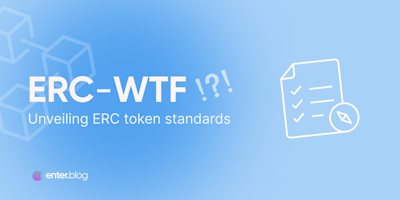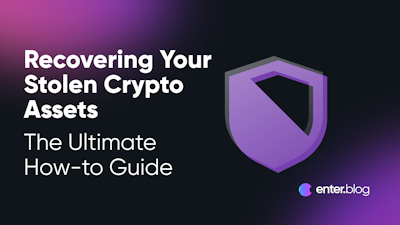
Watch out for these 6 common crypto scams!
With the rising number of people entering the exciting world of crypto and NFTs, a dark side follows. In this article we cover everything from fake giveaways to dusting attacks, so you know what to stay clear off when enjoying the space.

The meteoric rise of cryptocurrency is making people a fortune, but many of the people making a killing are not doing so by investing their own money but rather by stealing it from others. Unscrupulous scammers have found a number of ways to defraud people out of their cryptocurrency, so if you are thinking about getting started with crypto, then it's important that you are aware of the most common scams going on in the crypto space.
This article will go over six of the most common crypto scams. We will look at what the scams are, how they work, and most importantly, how you can avoid them.
Investment Scams
One of the most common crypto scams currently circulating is the investment or business opportunity scam. The way the scam works is pretty straightforward; typically, what happens is that a cryptocurrency investor will lure unsuspecting people to a fake website where they will learn about an enticing or lucrative opportunity. Once on the site, the victim will be encouraged to start investing with the promise of making quick, easy money. Generally, these sites have fake celebrity endorsements that lend credibility to the scam.
What happens is that as soon as the victim completes their transaction, they never actually receive any money; their initial investment simply disappears, never to be seen again. This is basically a 21st-century version of the classic Ponzi scheme. Remember, if it sounds too good to be true, then it is, and you should never trust anyone who's guaranteeing that you'll make money or get rich quick.
Fake Apps
Although cryptocurrency can be a great investment opportunity, crypto is ultimately a digital payment method, and as such different cryptocurrencies use different apps. Scammers have learned to replicate those apps to great effect. In fact, many people have downloaded fake apps believing them to be genuine cryptocurrency software. The idea behind this scam is really simple. Once you install the fake app and load your account, you are basically just sending your money directly to the fraudsters.
In addition to stealing your money, the scammers can also steal your login credentials, and so if you signed up with an email and password that you use for other sites such as social media sites, or even worse, your actual banking information, then things can go from bad to worse really quickly. Pay attention to the name of the app very closely; if anything is misspelled or if you notice any inauthentic branding, then chances are that it's a fraudulent app.
Social Media Scams
Another common crypto scam that's gaining in popularity is the so-called social media crypto scam. Basically, the way that this scam works is that a post will be sent out via social media that will look legitimate; generally, it will be an advertisement of some sort that requests payment via cryptocurrency. In most cases, many people will respond and interact with the post, which makes it seem legitimate and credible, but this is all part of the scam, and chances are that bots automatically generated those responses. In some cases, it can even be the case that you see a response from one of your friends whose account has been hacked.
A variation on this scam works with social media influencers recommending a new cryptocurrency that doesn't actually exist and is totally fake. What happens is that once you load your account in the fake crypto app, you lose all of your money. Some of these fraudulent apps are even more malicious and what happens is that when you input your payment credentials, the software will automatically multiply your payment, draining your bank account entirely.
If you notice anyone on social media asking you to pay for anything with cryptocurrency, or if you see an ad for a new cryptocurrency on social media, then odds are that this is a scam, and you should do a ton of homework before committing any money to this sort of thing.
Phishing
Phishing is one of the oldest and most notorious forms of cyber attack. Generally speaking, the way it works is that you'll receive an email asking for money. In most cases, these emails will seem to originate from trusted sources, when in fact, they are just emails that are fraudulently using the logos or credentials of known trusted brands that you have dealings with.
The crypto phishing scam involves a criminal acting as a new cryptocurrency company that's offering a too good to be true price on their initial coin offering (ICO). As with the other scams on this list, the story is much the same, as soon as you load your account with the fraudulent cryptocurrency app, you will lose all of the money you invested along with your login credentials. In the worst-case scenario, the scammers might even attempt to steal your identity and drain your bank account.
Loader or Load-Up Scams
The loader or load-up cryptocurrency scam works a bit differently from the others but is equally as nefarious. The way it works is that somebody will reach out to you and straight up ask for your account login credentials. Most often, the scammers will state that they are successful investors who simply require higher limits. In exchange for allowing them to use your account, the investor promises to give you a high percentage of the proceeds from their own crypto investments. In reality, what happens is that the scammers will load the victims' accounts and then drain them, taking all of the crypto and transferring it to their own accounts, and then cashing it out.
As a general rule of thumb, you should never give anybody your account for a cryptocurrency app or anything else for that matter. In almost all cases, the scammer will appear to be a trusted source, but in reality, anyone that you can actually trust will never ask you for your login credentials. Remember, anyone asking for your login credentials is a scammer; regardless of how authentic and genuine they appear to be.
Dusting Attacks
Crypto dust refers to a small amount of cryptocurrencies, usually the leftovers from trades where one did not manage to transfer 100% of the tokens. In a dust attack, bad faith actors will send dust to multiple wallets (sometimes several hundred thousand wallets at a time) and then wait for users to unknowingly or accidentally spend the dust.
Some dust attacks involve legit cryptocurrencies. Here the goal is to de-anonymize the user, by connecting multiple change addresses with each other. This can allow the hacker to trace the addresses to each other, and by combining information from the blockchain with information obtained elsewhere, they may be able to connect the wallet address to a person. Now, the hacker can engage in phishing or social engineering to gain access to the wallet.
In other dust attacks, also known as Token Approve Function Exploits, the attacker sends malicious tokens to multiple wallets. Often the tokens will look like they're worth hundreds of thousands of dollars to tempt users to try and sell them on a DEX as quickly as possible, but usually the token won’t have any liquidity. When users approve the malicious tokens, the hacker is able to instantly drain the wallet.
Summary
Cryptocurrency is changing the way people invest, do business, and think about finance in general. Right now is a great time to get started with investing in cryptocurrency, and there is certainly a lot of money to be made. That said, make sure that you do things the right way, and be on the lookout for the scams that we've gone over in this article so that you don't end up being another victim of cryptocurrency fraud.
-
Learn more on the important topic of crypto security with enter.blog:
Bring it back to basics and brush up the basics with Wallet Security #1 & Wallet Security #2, and make sure to have a look at How to swap safely if you're new in the space!
Crypto & Learning
Hungry for knowledge? Here you can get acquainted with blockchain, wallet security, DeFi and much more.

PUBLISHED 8TH SEPTEMBER 2023
ERC-WTF: Unveiling ERC Token Standards
This article embarks on an in-depth exploration of the realm of ERC token standards, shedding light on their significance, diving into their intricate facets, and envisioning their potential integration beyond the confines of the Ethereum framework.




.png?w=400&fit=max)
